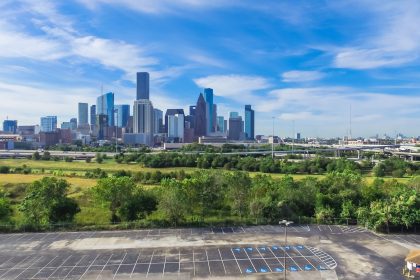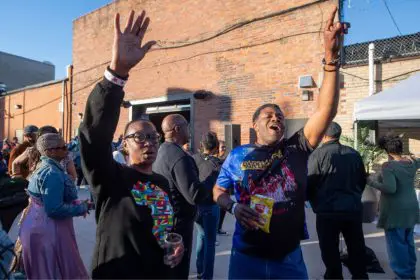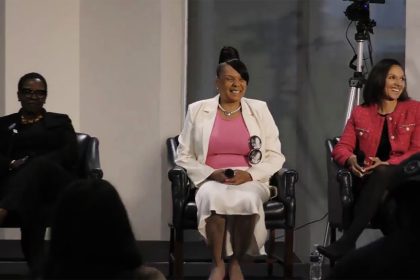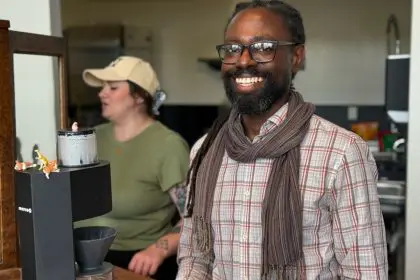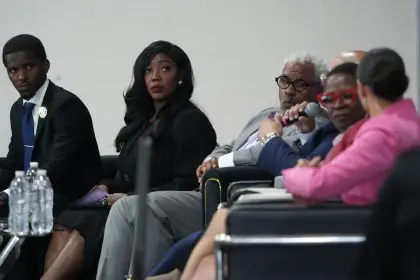A proud Detroit native, Marja Farrow has a vision for her community. She is an experienced leader, administrator and skilled in community and economic development, grant writing and management, planning, collaboration building, community engagement and public policy.
An ordained minister, Farrow understands the value proposition of building a company and serving the community, focusing on how real estate plays a role. Mrs. Farrow currently serves as Chief Growth Officer at Farrow Group, Inc. In this role, she is responsible for financial oversight, establishing new relationships and partnerships, compliance with the relevant regulatory agencies, project management and fostering strategies for sustainable, strategic growth.
Marja M. Farrow is an alumnus of the Goldman Sachs 10,000 Small Business Program, Motor City Contractor Fund, the Initiative for a Competitive Inner City Building for Growth Program, and the University of Michigan where she earned a B.A. in Political Science and a Master of Urban Planning.
Mrs. Farrow stopped by for a short chat with rolling out publisher and CEO Munson Steed to discuss the importance of collaboration in the redevelopment of Detroit. Here’s their conversation:
Why is it important for organizations like the Rocket Community Fund and Gilbert Family Foundation to provide financial support to contractors, groups, and nonprofits in the real estate sector to drive community development and growth?
I think it’s essential and phenomenal. It’s a great time to be in Detroit for several reasons. [I’m here for] any organization committed to uplifting Detroit, its people, its businesses, and the future for our collective good… The Rocket Community Fund and Gilbert Family Foundation have truly been fulfilling that role. They have benefited several nonprofit organizations, some of which I’m very familiar with and some that I hadn’t even heard about until I heard about their programs through the Rocket Community Fund. There are hardworking people out here running nonprofits on bare-bones budgets, trying to make our neighborhoods and streets better for the current and future generations. So, anybody who comes alongside and can lift up those visions and support them with funding to bolster [them] and make our community better is wonderful.
When you think about growth, how important is collaboration in what you do to sustain and increase growth?
Collaboration is essential. “No man is an island,” and no woman is an island. So, finding the right partners—people who are like-minded, who have similar values, similar vision—[is important when you’re] rolling your sleeves up and figuring out how we get to where we want to be together, even if our paths are a little bit different. [We ask,] “How can I help you? How can you help me?” Because, really, our destinies are interrelated. So, I think collaboration is key.
In a city like Detroit, where homeownership has historically been prevalent, but now that the inventory has aged and you have seen the flight or the departure, how does the rebuilding strategy influence your current initiatives?
What the Farrow Group tries to do is to be a good employer. We want to be a place where people know they can come and have a good job. That means they have job stability, a living wage, benefits that help them, and some flexibility. That’s where we see our role fitting in because people need places to work, and people want to work in a city where they can [afford to] live. We think that’s a great combination. Whether it be market rate or affordable, we need all the housing units. We need more supply. With all the excitement and redevelopment, people really do want to live in the city. So, [we make sure] they have an opportunity to do that and [connect] them with local employment solutions and opportunities.
How important is forecasting for those young brothers and sisters trying to [be a] part of the development group [investing] in Detroit? How important is it to be able to forecast where the next move is [and] what neighborhoods are investable so that you could see [profit] in the next 5 to 10 years?
“Steady and patient” is the name of the game. We like things to be a little bit faster, of course, but with real estate development, the decline that our city experienced didn’t happen overnight, and the resurgence that we’re seeing had a burst but has been steady to get to this point. Paying attention to the trends in real estate, the players in real estate, and if this is where you want to be [are key]. Stay connected and stay committed, and I think you’ll see what you need.
[For] a young person thinking about moving to Detroit, what are just two or three [developing] neighborhoods [for] a first-time buyer?
Detroit has so much potential. We are a city of neighborhoods, so it’s hard to call out one, two, or three specific neighborhoods. I grew up in Grandmont Rosedale, so I’m going to always lift that up. It might not necessarily be the most affordable right now, but that’s the nature of the market. One of the assets is that the land bank holds quite a few properties, so people interested in buying a property that needs a little work instead of something move-in ready have an opportunity. They work in neighborhoods all across Detroit, so whether you want to live on the west side or the east side, there are opportunities.
Detroit is a happening place; anybody looking to come here will find several opportunities. [It’s important to consider] all the other quality of life factors like what’s within a 15-minute radius of the neighborhood. Can I get groceries close by? Is it walkable? Is it close to a park? Detroit is growing in all these categories, so come and see all the neighborhoods, and you’ll find one that meets your needs.
You have huge, beautiful natural resources surrounding Detroit. As an urban planner, I’ve seen some of the most beautiful walking spaces that rival other major cities. As an urban planner, how do you see these walkways and connections to neighborhoods [in the city] now?
It’s important. As the Motor City, we have a long [history] of driving our cars, and we love our cars here in Detroit, but not everyone is about the car life, especially millennials and younger generations. It’s important to provide different [pedestrian friendly] connections [in the city]. People want to have multiple modes of transportation and ways to get around. The city is improving in that area. The riverfront is one of the top in the nation and very walkable. Growing up, that wasn’t the case. Now, you can get from the east to the west part of the riverfront and walk the whole thing, which is phenomenal.
You are a sister in real estate and development. Why would you encourage other sisters to pursue this field?
Great question! It’s very timely because I am a member of the Michigan Association of Planning, the Michigan chapter of the National Association of Planning. We just started a Michigan professional Black planners group because we think it’s imperative to increase the visibility of Black people in the planning profession. We want young people to understand that urban planning is a very multidimensional career. It’s a viable career [that is] important to our communities, neighborhoods, cities, and states. It’s something I’m passionate about.
I have a young man from my church who has been successful in entrepreneurship and other ventures, and he recently told me he’s thinking about urban planning. He asked his dad if he knew an urban planner, and his dad said, “Yeah, Marja.” He didn’t even know I did that. There’s a lot of interest in urban planning among young people. There are so many things you can do — transportation planner, long-range planner, housing developer. It touches so much of our everyday lives, and it’s always going to be important. Ensuring that people continue to choose this career path is important, and I’m passionate about it.
When you think about the Rocket Community Fund’s continued investment in Detroit, if you look back 10 years, did you imagine you’d see the city you know now?
It’s what we hoped for. Ten years ago, the city didn’t have the resources it has today. The city had a different reputation, and as local native Detroiters, we saw the challenges every day, but we still had hope for better days ahead. We knew Detroit could be one of the top cities in the country. Seeing that come to fruition, it’s not unimaginable, [but] some things that pop up are surprising, like a Gucci store [opening] downtown. But it’s been a long time coming, and I’m excited about what’s still to come.
From a planning perspective, you’ve seen more hotels and development in the Cass Corridor. When you think of planning, what do you see taking it all the way out? The East Side seems to be going through its own transformation.
The East Side is changing very fast, but it has unique infrastructure challenges. The city is trying to work with the communities and residents to address [this]. In 2021, we had a major storm that affected many communities, especially on the East Side. Addressing those infrastructure concerns thoroughly and timely is essential for the future of the East Side community. I see a future where the East Side is thriving, the West Side is thriving, and the city is bursting at the seams. The East Side had more vacant land than the West Side, offering more development opportunities. With the housing demand up, we’re rethinking community uses and making vacant areas into housing and other developments.
If you were giving a commencement speech at the University of Michigan, Spelman, Dillard, Xavier, or Morehouse, encouraging individuals to be involved in development and planning, what would you say, and what would the title of your speech be?
Wow, that’s putting me on the spot! Normally, they would give me a month’s notice to work on this speech. Instantly, I would say [the title is], “The Future Needs You.” I’m almost middle-aged, and young people are different. But as someone who grew up in Detroit and was the deputy director of the planning department in my late twenties and early thirties, anything is possible in Detroit. I’m from the neighborhood; I went to Cass [High School and] the University of Michigan. I came back home to a city that nurtured me. Detroit allows you to make your dreams come true. The American dream is challenging, but the grit and grind in Detroit are real. If you’re willing to put your head down, do the work, make the right collaborations, have patience, and be passionate, there’s no better future for you than here in Detroit.

